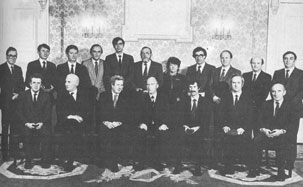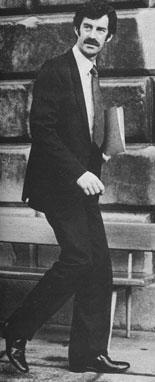How long more must we tolerate this awful Government?
The Government has already taken decisive steps to ensure that it will join the increasing ranks of the worst the country has known. the composition of the Cabinet and the Programme for Government are resolute commitments in that direction.
The primary significance of the composition of the new Government has been the refusal of Garret FitzGerald to re-appoint John Bruton to the Department of Finance. Almost alone among Irish politicians in recent years, Bruton identified the problems in the Irish economy in terms of structural problems in public expenditure and structural problems in the public service, both in the Dail and the civil service.
Although from a comfortable large farmer background and instinctively conservative, Bruton's exposures to the problems in the Irish economy drove him over the last three years towards a radical analysis of the issues and radical solutions, certainly in terms of Fine Gael politics.

Bruton came to perceive that the unreformed structure of the civil service itself was a major barrier to Governments and indeed Dails coming to terms with the mounting problems in the realm of the public finances. He also came to perceive that it was the lack of accountability over public expenditure which was largely to blame for the uncontrolled growth of current expenditure and the massive wastefulness of capital spending. His analysis was very much a personal one within Fine Gael. His contact with FitzGerald was at all times minimal - indeed FitzGerald effectively sought to exclude him for the drafting of the June 1982 election programme, even though he was then spokesperson on Finance.
In Government the relationship was inevitably closer, although Bruton was impatient with FitzGerald's longwindedness in Cabinet and the protracted and often endless nature of Cabinet and Cabinet sub-committee meetings. Although Bruton went along with it, it was FitzGerald who was primarily to blame for the endless hours that the last Coalition Cabinet spent on the 1982 public expenditure estimates in the autumn of 1981 - only a few hours were spent at the end of the day on taxation, the issue on which the Government was to fall.
It was Bruton also who insisted immediately on coming into office that a supplementary budget be introduced to deal with the huge budget deficit problem which the Haughey Government had left behind - that budget was probably the instrument of the country's salvation, for the time being, from the clutches of the IMF. On going into Opposition it was Bruton who immediateIy set about drafting policy - again FitzGerald devoted himself to organisational matters as he had done from 1977 to 1981 to the virtual exclusion of policy considerations. During the months from March onwards Bruton started to make a series of speeches about the trivialisation of Irish politics and the indifference which most politicians displayed to policy - he must surely have had his leader in mind during some of these discourses.
He produced a statement on job creation which was presented in a desultory manner at a press conference chaired by FitzGerald in the old College of Art building in early October. Pressed on specifics on public expenditure even then, FitzGerald was adamant that opposition parties could not be expected to produce answers. Bruton was of the opinion that answers could and should be provided - a difference which was admittedly muted then but symptomatic of a basic difference between them. The failure now to re-appoint Bruton to Finance represents FitzGerald's impatience with Bruton's independent line and FitzGerald's indifference to the kind of issues which Bruton came to sponsor.
FitzGerald is basically a conjurer when it comes to the public finances. That is, he believes that problems can be solved by juggling with figures rather than through hard political choices. Alan Dukes has never had to take a hard political decision in his life. His training and background suggest that he is not au fait with the kind of structural issues which pre-occupied Bruton. He will be more in the FitzGerald mould and between them they should manage to make an amazing hames of the economy. The difficulties with the public finances cannot be solved other than by dealing with structural problems: the contract with the doctors for instance, the commitment to the financing of third level education, the massive wastage in the public service itself, caused largely by the failure to reform the service.
But apart from that the focus of political attention cannot be diverted onto the public finances issue and the issue of public expenditure generally without a re-structuring of the Dail and allowing the accountability for public expenditure to become meaningful. Ministers for Finance instinctively will want to guard their personal prerogative over decision-making on public expenditure - generally, they would resist the extension of this decision-making to the Dail in any meaningful way. Bruton was a notable exception in that respect. There is nothing so far about Dukes to suggest he will be any different to the traditional Finance ministers. Other appointments are inept also, but none as crucial as this.
Bruton's exclusion from Finance is merely reflective of the lassitude which was evident in the Programme for Government agreed between Fine Gael and Labour. There was never any doubt but that FitzGerald and Spring could come to an easy agreement on policy, primarily since both parties hadn't bothered to spell out before the election in any detail what they proposed to do if they got into Government. But what has now come out from their joint deliberations is pathetic.
The first piece of news which the programme imparts, though a serious attempt is made to fudge the issue, is that the budget deficit will be phased out over five years, not four. In reality this doesn't matter, for the primary requirement in relation to this deficit is that it begins to decline progressively as a percentage of GNP over the next few years. But the facility whereby Fine Gael was able to concede on this issue, having made a fetish about it in the course of the election campaign is suggestive of the party's general lack of seriousness.
Taking that issue in conjunction with the apparent abandonment of the structural reform issue which Bruton most forcibly represented, then we have serious problems indeed. For it will not be possible to phase out the budget deficit even over five years, without a radical alteration of the shape of public expenditure.
Then there is the gobbledegook about task forces, national planning boards, etc, in relation to economic planning. There is a virtual certainty, especially if Garret FitzGerald himself has anything to do with them, that these bodies will produce reams of boring and indecipherable (hopefully) material, which will have one major and consistent characteristic: it will contain no decisions.
Then there are the scare plans for further capital expenditure - remember it has been this segment which has really got us into such hopeless trouble over the last several years. There is no hint in the document of an anxious awareness of the blunders that have been made in this area in the past. Instead there is the blithe commitment to spend £100m from the contingency fund on infrastructural projects - happily, unnamed - and a further £200m on "investment in profitable commercial projects". Presuming this money actually gets spent, which is by no means a certain presumption, then the chances of it being wasted are very high.
The setting up of the National Development Corporation is scary for another reason as well. It effectively means that there will be no chance of any of the existing public sector enterprises which were expected to be "profitable commercial projects' will get closed down. This list of these enterprises are helpfully appended. They include: Irish Steel Holdings (losses of £50m this year), NET (£50m actual loss), the Irish National Petroleum Corporation (losses, including Whitegate, should run at about £50m) etc., etc.
 There are several other commitments to expenditure, none of which have been costed. These include:
There are several other commitments to expenditure, none of which have been costed. These include:
- altering the "VAT at the point of entry" scheme.
- special help for small firms.
- further cattle disease eradication (with not a mention of the vast amounts of public money already wasted on these projects).
- more money for ACOT.
- PAYE reduction.
- increases in social welfare.
- the introduction of an income related pension scheme.
- the abolition of the £5 outpatient hospital charge.
- the restoration of items recently removed from Medical Card holders.
- the improvement of the psychiatric hospital services.
- the building of 30,000 new houses.
- a national scheme for adult and continuing education.
In addition, about 20 issues will be reviewed by the new Government, leading to the obvious query: what were all these people doing over several years in public life if they haven't reviewed these matters long ago?
There'is one further problem with this Government - one which, at least for us journalists, could prove fatal. That is the boredom factor. During the course of the campaign Fine Gael sought to sedate the assembled press by endless answers to the most innocuous of questions. In his first speech in the Dail as the new Taoiseach Garret FitzGerald tried this on the House (successfully).
Not alone is this Government likely to screw up this country once and for all, it is also likely to bore many of us to death in the meantime. At least they could never have said that of Charlie Haughey.
